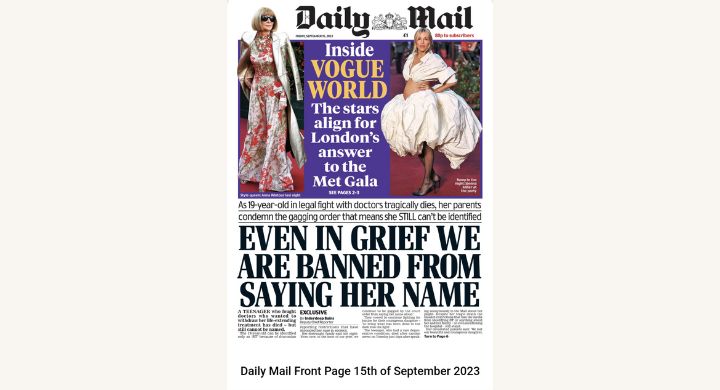The case of Sudiksha Thirumalesh, supported by the Christian Legal Centre, won huge media attention and several front page headlines as people were shocked at the way doctors and judges treated this desperately ill young woman. Now the Daily Mail journalist who exposed the story has won a media award and a ‘Highly Commended’ nomination for her efforts.
Draconian transparency order
The story first broke on 31 August 2023. At that time a transparency order prevented us from releasing Sudiksha’s name. She was known merely as ‘ST’. The draconian transparency order prevented Sudiksha or her parents from giving any media interviews or making any appeal for funds.
‘Actively dying’
Nineteen-year-old Sudiksha suffered from a rare genetic mitochondrial disease which caused chronic muscle weakness, but did not affect the functioning of her brain. The hospital argued that she was “actively dying” – an extraordinary way to describe her. The NHS Trust sought permission to stop her regular dialysis which would mean she would die from kidney failure within a few days.
‘Lacks mental capacity’
Two psychiatric experts instructed by the hospital examined Sudiksha and told the court that she was not suffering from any mental health illness and had the mental capacity to make decisions about her own medical treatment. Sudiksha made clear that she wanted the doctors to continue to sustain her life and wanted the chance to participate in a clinical trial of a new therapy which may have given her a chance of survival. In her own words, she said that she “wanted to die trying to live”.
Incredibly, the hospital doctors argued that Sudiksha was ‘delusional’ because she wouldn’t agree to their plan to remove treatment! Mrs Justice Roberts ruled that Sudiksha lacked mental capacity to have a say in the matter and was mentally incapable of making decisions for herself, rejecting the clear opinion of both psychiatric experts. The judgment said: “In my judgment… ST is unable to make a decision for herself in relation to her future medical treatment, including the proposed move to palliative care, because she does not believe the information she has been given by her doctors.”
In November 2022, Sudiksha had signed a lasting power of attorney to authorise her parents to make decisions on her behalf in the future if she was to lose mental capacity. The Hospital asked the Court of Protection to set aside the document on the grounds that she did not have mental capacity to sign it.
The Daily Mail ran a front-page story about Sudiksha on 9 September even though she could not be named or pictured, highlighting the obvious injustice of the case. 28,000 people signed a petition to stop the hospital withdrawing her treatment even though she remained unnamed.

Gagging order remained after death
Just a few days later, Sudiksha died from a cardiac arrest. Even then, the transparency order remained in force. Her family spoke powerfully about how they were afraid to leave her bedside because they knew the doctors wanted to remove her treatment. They said that Sudiksha had refused to give up hope right to the very end. They were deeply disturbed to find that if you disagree with the NHS then for that reason alone you can be considered ‘delusional’.
Another Daily Mail front page headline raged at the injustice of grieving parents unable to say the name of their daughter.

It was not till 22 September that the reporting restrictions were finally lifted, and Sudiksha was able to be named. Once again, the Daily Mail ran a front-page story revealing her name and now also with pictures of her. The story now attracted the attention of mainstream media, with the BBC and others covering it.
Then on 29 September, a gagging order preventing the NHS trust from being named was also lifted, revealing that it was doctors at University Hospitals Birmingham NHS Foundation Trust that had argued that she was ‘delusional’. Sky News covered the story.
The Daily Mail made a 19-minute video documentary about Sudiksha’s story entitled: Sudiksha: ‘Condemned to Die in Secret’ – The Shocking Story of the 19-year-old’s fight to live.

Overpaid benefits
Sudiksha’s parents were forced to give up work in order to remain at her bedside in the final months of her life, and found themselves also fighting a legal battle. To add to their suffering, the government later told the family that they owed £8,000 in overpaid benefits.
Media coverage of their overpaid benefits shamed the government which U-turned days after the story broke and cancelled the overpayment.
‘Delusional’ ruling overturned
Christian Concern continued to pursue justice on behalf of Sudiksha and her family even after her death. The ruling that Sudiksha was ‘delusional’ just because she disagreed with the NHS’s proposed plan of action could not be allowed to stand, particularly as it went against the expert opinion of two psychiatrists. With the help of the Christian Legal Centre, Sudiksha’s family took this decision to the Court of Appeal. In July this year, in a landmark ruling, three judges overturned the decision of the Court of Protection that Sudiksha lacked mental capacity to make decisions about her medical treatment. The BBC covered the story.
This important judgment reaffirms the right of patients to disagree with their doctors without risking being declared mentally incompetent and having their best interests assessed and enforced by the courts. The ruling potentially affects thousands of patients. This is a remarkable legacy from an incredibly brave young woman who should never have been deemed ‘delusional’ in the first place.
Media awards
In October, Daily Mail journalist Inderdeep Bains won the Best Investigation award at the Asian Media Awards 2024 for her coverage of Sudiksha Thirumalesh. The award stated:
“Through a series of compelling articles, Inderdeep brought the human element of Sudiksha’s legal struggle to light, transforming her into more than just a case number to a vibrant teenager with dreams and aspirations, trapped in a system seemingly designed to silence her.
“Doctors has concluded treating the 19-year-old, who suffered from the same rare mitochondrial disease as baby Charlie Gard, was futile and life-sustaining treatment should be withdrawn.
“Despite Sudiksha’s ability to communicate and express her desire to ‘die trying to live’, the NHS argued in court that her refusal to accept her prognosis was delusional and indicative of a lack of mental capacity.
“A gagging order had shrouded the case in secrecy reducing Sudiksha’s identity to the initials ‘ST’. In the face of these legal limitations, Bains was committed to ensuring Sudiksha had a voice and that her story reached the public.
“She challenged the gagging order and through a series of compelling articles, brought the human element of Sudiksha’s legal struggle to light, transforming her into more than just a case number to a vibrant teenager with dreams and aspirations.”
Last month, Inderdeep Bains was Highly Commended at the British Journalism Awards 2024. The judges said: “Inderdeep’s determination to give a voice to a vulnerable young person who literally could not speak for herself resulted in real-world discussion around policy change. A heartbreaking story told with compassion and vigour.”
A remarkable legacy
Sudiksha’s story touched the hearts of millions of people worldwide. Her incredible bravery, her articulation of her plight, and the obvious injustice of her treatment by the NHS and in court. Her legacy includes a judgment which should prevent anyone else being deemed delusional merely for disagreeing with the NHS. That is a very important legacy. Christian Concern was proud to support her and her family throughout the struggle and to finally obtain some measure of posthumous justice.
Sudiksha’s case also showed the importance of fighting these end-of-life cases. It is deeply shocking that a judge could decide against expert witness that a patient is ‘delusional’ merely for disagreeing with her doctor’s outlook. Hopefully this will never happen again. Judges have also ruled in several other end-of-life cases that it is in the ‘best interests’ of a patient to die, even when an offer of alternative treatment at no cost to the NHS was available.
Legalising assisted suicide would make hospitals dangerous places
Perhaps it is no surprise then to find ourselves fighting a parliamentary Bill to legalise assisted suicide. Sudiksha’s case shows, sadly, that NHS doctors and judges cannot be trusted to protect the lives of vulnerable patients – even with the law as it stands with assisted suicide being a criminal offence. If assisted suicide was legalised, then hospitals could become very dangerous places indeed for vulnerable patients. Please pray that the bill will be stopped at its third reading in 2025.



